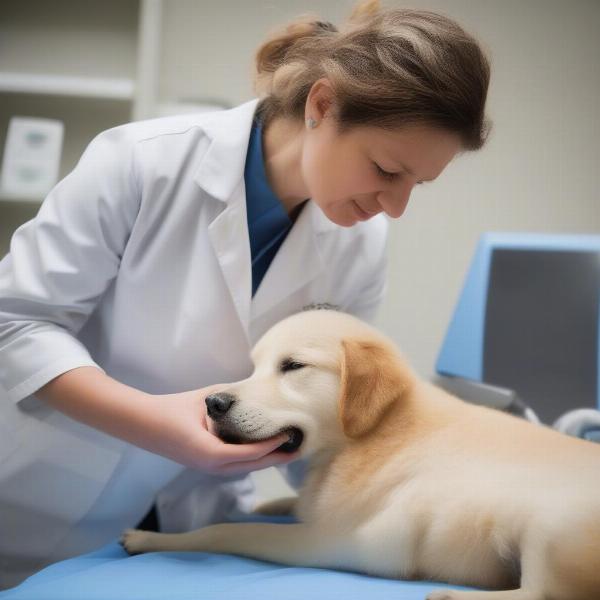If your dog is straining to poop but nothing comes out, it’s a concerning situation that requires attention. This can range from a simple case of constipation to a more serious medical issue. Understanding the potential causes and knowing what to do can help you ensure your furry friend gets the right care. This article will explore the reasons why your dog might be experiencing this issue, offer practical solutions, and guide you on when to seek veterinary attention.
Understanding Why Your Dog Can’t Poop
Several factors can contribute to a dog’s inability to defecate. It’s important to consider their diet, hydration, activity levels, and overall health when trying to pinpoint the cause.
Diet and Hydration
A lack of fiber in your dog’s diet can lead to hard, dry stools that are difficult to pass. Similarly, dehydration can make the problem worse. Ensuring your dog has access to fresh water and a diet rich in fiber is crucial for healthy bowel movements.
Lack of Exercise
Just like humans, dogs need regular exercise to stimulate their digestive system. A sedentary lifestyle can slow down gut motility, leading to constipation.
Ingested Objects
Sometimes, dogs ingest objects they shouldn’t, such as toys, bones, or rocks. These foreign bodies can obstruct the intestines, preventing the passage of stool.
Medical Conditions
Underlying medical conditions such as hypothyroidism, megacolon, or certain neurological disorders can also affect bowel movements. In older dogs, age-related changes can contribute to constipation.
What to Do When Your Dog Can’t Poop
If your dog has been straining to poop for more than a day or two without success, it’s time to take action.
Increase Fiber and Water Intake
Adding canned pumpkin, sweet potato, or fiber supplements to your dog’s food can help soften the stool. Make sure they have access to fresh water at all times.
Encourage Exercise
Regular walks and playtime can help stimulate bowel movements.
Try a Gentle Laxative
Over-the-counter dog laxatives are available, but it’s essential to consult with your vet before administering any medication.
When to Seek Veterinary Care
If your dog is showing signs of distress, such as vomiting, lethargy, or loss of appetite, along with the inability to poop, immediate veterinary attention is necessary. Also, if home remedies haven’t provided relief within a day or two, it’s time to see the vet. They can diagnose the underlying cause and provide appropriate treatment. This might include manual removal of impacted stool, medication, or even surgery in severe cases.
Signs of a Serious Problem
- Vomiting
- Lethargy
- Abdominal pain or distension
- Loss of appetite
- Blood in stool (or lack thereof)
 Veterinarian Examining Dog
Veterinarian Examining Dog
Conclusion
Seeing your dog struggle to poop is distressing, but understanding the potential causes and taking appropriate action can make a big difference. Remember to monitor their diet, hydration, and exercise levels, and don’t hesitate to seek veterinary care if the problem persists or worsens. By being proactive and informed, you can help your furry friend maintain a healthy digestive system and overall well-being.
FAQ
- How can I prevent my dog from becoming constipated? Ensure a fiber-rich diet, plenty of fresh water, and regular exercise.
- Is it safe to give my dog human laxatives? No, never give your dog human laxatives without consulting your veterinarian. Human medications can be toxic to dogs.
- How often should my dog poop? Most dogs poop once or twice a day, but this can vary depending on their diet and activity level.
- What are the signs of an intestinal blockage? Vomiting, lethargy, abdominal pain, and inability to pass stool are common signs of an obstruction.
- Can stress cause constipation in dogs? Yes, stress can affect a dog’s digestive system and lead to constipation.
- What are some good sources of fiber for dogs? Canned pumpkin, sweet potato, and commercially available fiber supplements are good options.
- How long can a dog go without pooping? If a dog goes more than two days without pooping, you should consult a veterinarian.
ILM Dog is your global resource for expert dog care advice. We offer comprehensive information on breeds, health, training, nutrition, grooming, and much more. From puppy care to senior dog needs, ILM Dog provides practical tips and guidance to help you navigate every stage of your dog’s life. For inquiries, contact us at [email protected] or +44 20-3965-8624.